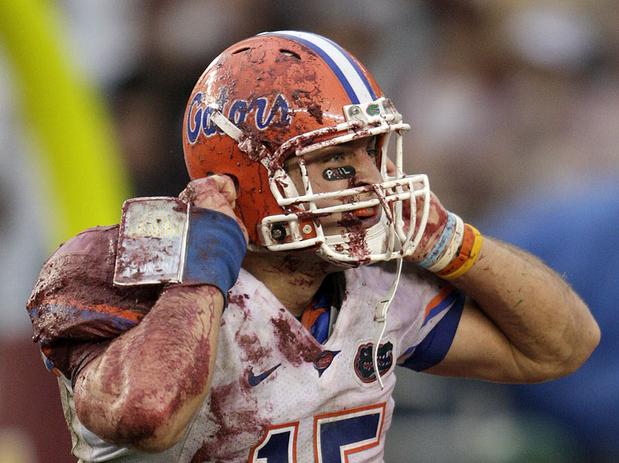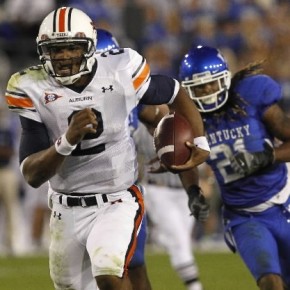
A couple of fascinating articles about the pressure on NFL quarterbacks have appeared in the last week. First off is this piece from CBS Sports columnists Gregg Doyel. Unusually even-tempered for the typically aggressive Doyel, the column is loaded with talk of expectations vs. talent, a specific football analogy for the broader study of identity in light of the law and grace dialectic. At issue is the persistent tendency of NFL teams to draft uber-talented run-first quarterbacks only to then require them to be traditional, drop-back pocket passers. The column focuses in particular on overall number one draft pick Cam Newton and his role within the Carolina Panthers offense, but quoted below is the juiciest portion.
From Doyel:
“Even a 7-year-old wouldn’t try to fit Tim Tebow into a typical NFL offense. Because Tim Tebow isn’t a typical quarterback. All of these guys are unique little snowflakes, bigger or smaller or faster or slower than this guy or that guy, but Tebow is one of the most unique snowflakes in the history of NFL quarterbacks. (Michael Vick also comes to mind.) He’s a little bit Bart Starr, and a lot Bronko Nagurski.
And the Broncos want to wedge him into their Kyle Orton-sized slot at quarterback? It’s not going to happen. Brady Quinn has a better chance of succeeding in that role than Tim Tebow, and what do you know — Quinn appears to be ahead of Tebow on the depth chart.
This isn’t Tebow’s fault. It’s Denver’s fault. It’s the NFL’s fault, too, this unimaginative league taking some of the best, most unique talents the college football feeder system has to offer — and then ruining those talents. Instead of nurturing Tebow in a system where he can bull-rush here and throw the ball on the run there and improvise everywhere, the Broncos want Tebow to take snaps under center (which he’s never done), do a three- or five- or seven-step drop (which he’s never done), then step into the pocket and deliver a classic NFL strike (which he’s never done).
Sounds perfectly reasonable, doesn’t it?
No. It does not. It sounds stupid, even if NFL teams are smartly trying to protect their investment at the most expensive position in the league — reasoning that a “running” quarterback will soon be an “injured” quarterback. On paper it sounds like a solid theory, but in real life? Not so much.
Some of the best quarterbacks in NFL history ran, and ran a lot. And never paid the ultimate price. Roger Staubach. Fran Tarkenton. Steve Young. Steve McNair. Michael Vick. Those guys could throw the ball, yes, but they could run and their teams maximized those unique gifts. “
The takeaway here is that when grace is present – in this case, the common (though extraordinary!) grace of unbelievable football talent as given to Cam Newton, Tim Tebow, Vince Young, and Michael Vick – that grace should not be squashed. Let that grace go and flourish! It will almost certainly take some lumps, because these men are human and imperfect, flawed and sinful. But they are what they are – to reconstruct them unnecessarily is torment for them, and will have negative consequences far beyond their own selves.
Final quote from Doyel:
“Sometimes it works out. Kordell Stewart was allowed to be Kordell Stewart. Maybe it would work out in Carolina if the Panthers allowed Cam Newton to be Cam Newton. But that’s not what they’re doing. The other day the Panthers were in Cincinnati, and it looked to me like they wanted Cam Newton to be Jake Delhomme. That won’t work.
Let’s remember this, though, whenever Tebow and Newton and Pryor meet their ultimate demise. The word “bust” will be thrown around, but make sure you throw it in the right direction. Don’t throw it at the running quarterback who couldn’t make the transition to passing quarterback.
Throw it at the people who drafted that square peg and spent years trying to shove him into a round hole. Even a 7-year-old knows that won’t work. “
In another move from law to grace, The Daily columnist Dan Wolken has a powerful take on Tim Tebow. I’ve never been a huge Tebow fan (perhaps because he jilted my beloved University of Alabama and left us disheartened in the 2008 SEC Championship game), but offered him grudging respect as a tremendous football player. Though I am reluctant to embrace his brand of “work hard for Jesus” Christianity, I do appreciate his mission work and his overall Christian witness. That said, Tebow has been in an odd spot lately. Drafted in the first round of the NFL draft and looking to be the heir apparent for the Denver Broncos, Tebow has found himself in a position he hasn’t experienced since junior high school: sitting on the bench and holding a clip board, watching another quarterback lead his team to victory.
Dan Wolken, not particularly religious to the best of my knowledge, offers a startling word to Tebow and all of us by suggesting that perhaps Tebow look past his identity as a football star and be reminded of another, far more powerful identity.
From Wolken:
“Of all the great Florida quarterbacks who bombed out of the NFL — Danny Wuerffel, Shane Matthews and Doug Johnson among them — Tebow is on a trajectory to be the biggest bust of them all.
That realization has left him frustrated and his fans angry. At every level of football he’s played, Tebow has always been the toughest, best guy on the field, inspired by the belief that his success was predetermined and his destiny driven by a higher power. Now he’s in the NFL, America’s ultimate meritocracy, and Tebowmaniacs everywhere insist that he’s not being given a fair shot.
But if Tebow is truly who he purports to be, why should it matter whether he’s a starting quarterback or a career backup? If his values are really what they seem, who cares how many snaps he gets?
For better or worse, Tebow is bigger than a spot on a depth chart. His ability to impact people, to help them in real ways, transcends his ability to throw a football.
……..
That’s not the case for most athletes, of course. We view their significance solely through the prism of their success as professionals, which is why any critique of Tebow’s football ability gets serious blowback from his supporters.
But Tebow is unique. His Christian beliefs, his charity work, his celibate lifestyle; it’s all genuine. There’s nothing phony about him. That’s what made him a hero to millions; football was just the platform.
Now, he doesn’t necessarily need that platform anymore. He can still be a leading Christian voice, still inspire people to live better lives whether he’s on the sidelines or under center. He should consider that the biggest win he’s ever had.”
Now to be sure, there’s a little theology of glory in here, as Wolken is quick look at Tebow as an icon. Yet even those of us who are so very quick to run towards a “lame shall enter first” interpretation of the Christian faith will acknowledge that at times men and women are given a very public platform for the expression of the Christian faith, and perhaps Tim Tebow is one of those people. More important is Wolken’s contention that for one who has been found by Christ – rescued from sin and death, to whom a new identity has been imputed – everything else is passing. Football – in my own view the greatest game ever devised by man – will fail us. Legs break. Shoulders give out. The competition is sometimes simply better. In Tebow’s case, it may well be that in keeping with Gregg Doyel’s argument, someone else let Tim Tebow down by placing on him an expectation that he could never meet. Football fans could say the same thing already about Vince Young and, at earlier points in his career, Michael Vick. But in Christ, we are new creations. We are more than football players or teachers or lawyers or fathers or mothers bound up with our own neuroses and burdened with pressures placed upon us by other, often well-meaning people. We are freed and by the Master we are given a yoke that is easy and light.

COMMENTS
3 responses to “Identity, Expectation and the Run-First Quarterback”
Leave a Reply















Great stuff, Matt. From a football perspective, I think Doyel’s wrong to pin this as a running QB vs. pocket QB debate. The truth is that in the NFL Tebow is neither a running QB or a pocket QB – and therefore he’s the third string. He’s much too slow to run on NFL’s defenses and his delivery doesn’t have much zip, to say nothing about his accuracy.
What’s interesting to me about Tebow is that his NFL failure (at this point) speaks to the limits of human willpower. Tebow was never thought to be a great QB prospect, but he was chosen because of his off-the-charts “intangibles”. The idea was that he was such a hard worker and dedicated player he could work his way into being an NFL QB – if only he had enough time. Two seasons in, I think it’s fair to say that thinking is a farce. I think we’d rather blame the coach for Tebow’s failures than admit to ourselves that sometimes it isn’t enough to just work harder.
I was there for the fourth quarter of 2008 game and there in 2009 when that memory of not finishing the job drove us to stifle the running quarterback (and if you can do that with an NCAA defense you can certainly with an NFL one). We all remember Tim on the sideline, off by himself, weeping in humiliation and pride. It validated my theory that Tim’s gospel was one of gaining self glorification through “out working and out Jesusing the other guy”. I never really bought him or the spread.
At least Cam Newton is an honest phony.
Good point, Todd. I had probably thought about something along those lines, and you’ve greatly enhanced the idea I had for the second piece. To an extent, I think we can look at coaches, GMs and media in a bad light vis a vis their expectations, but true enough, the Tebow story is proof positive that sometimes working hard has very real limits. As Tim Keller has often noted, our identity must be somewhere else, lest we face a world of hurt and disappointment.